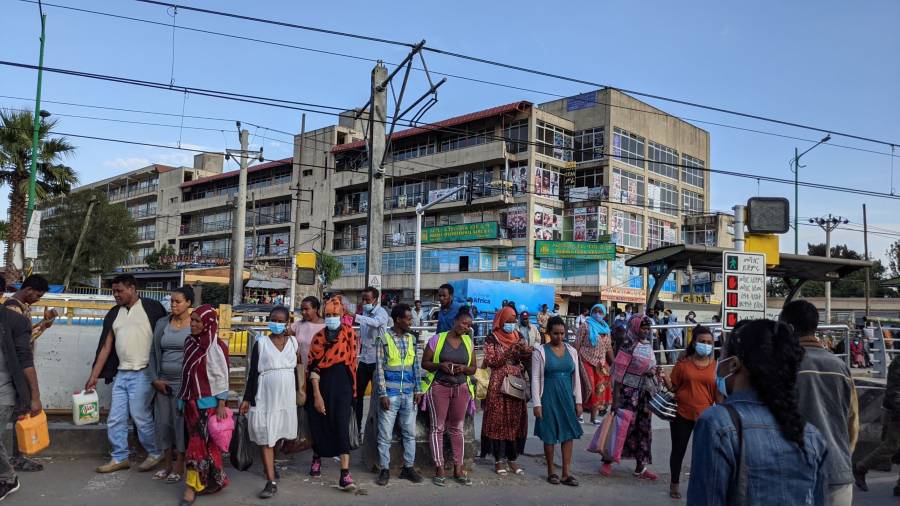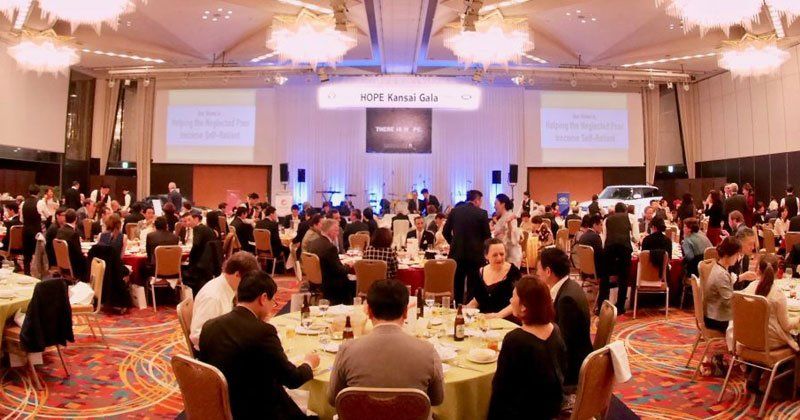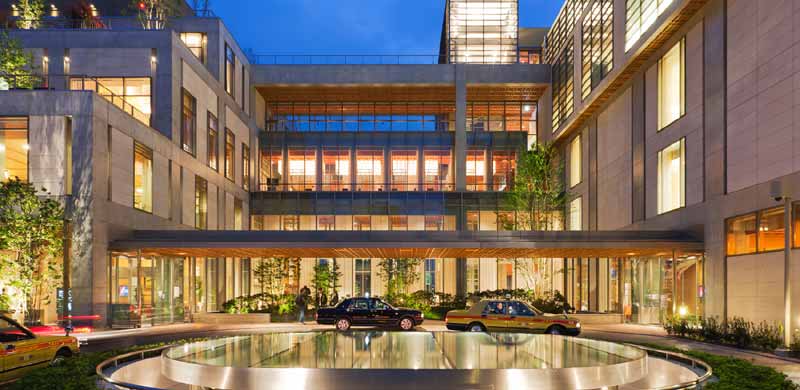Our Field Staff's quick return to Japan
Forced return to Japan once again
Due to an escalation in the armed conflict in Ethiopia, Akemi and I (HOPE Japan's field staff) had to suddenly evacuate the country and return to Japan on November 7th.
Some of you may be aware of the ongoing armed conflict in Ethiopia which began about a year ago in the Tigray region in the northern part of the country as a result of a power struggle between the Tigray People’s Liberation Front (TPLF) and Prime Minister Abiy Ahmed’s government.
It was during this conflict, which was confined to the north of Ethiopia, when we landed in Addis on Oct 11th, about a year and a half later after having left the country due to the pandemic. We were full of relief at having been able to return to the field, and were looking forward to returning to our Ethiopian colleagues and visiting the new project sites. Little did we imagine we would have to leave the country again in less than a month.
The development of Addis Ababa and the impact of the pandemic
Since our field assignments are long-term, as soon as we landed, we immediately began our application for our work permits, a long drawn-out process that requires patience in navigating several government offices. While we got the work permit application process going, we caught up with our friends and set out to re-familiarize ourselves with all things Ethiopian - the food, the city sights, and most importantly, the Amharic language.
We noticed a few changes since when we left Ethiopia in the Spring of last year: new road construction projects in several parts of the city, the almost finished construction of the Commercial Bank tower that is currently the tallest building in Ethiopia standing at almost 200 meters, the heavier traffic congestions in Addis, the new Friendship Park and Unity Park, all signs of Ethiopia’s growing development.
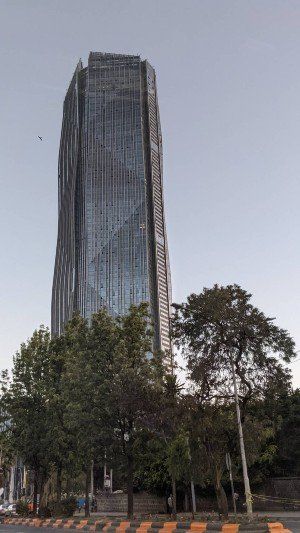
Commercial Bank Tower
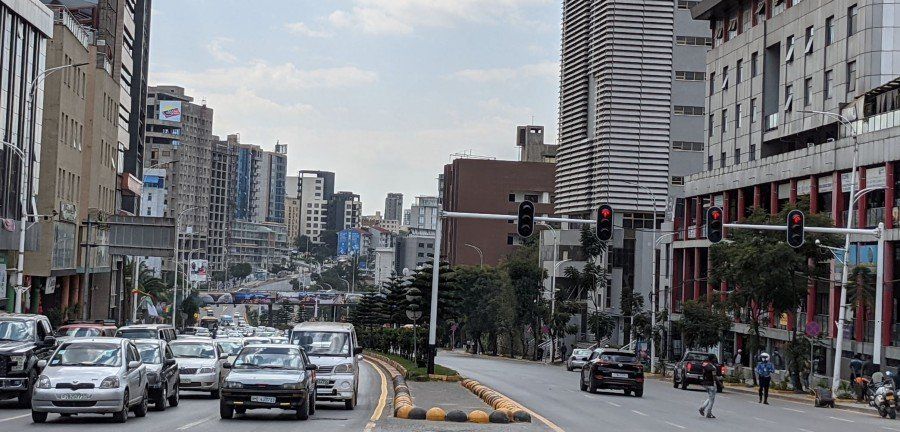
Downtown Addis Ababa
We also paid extra attention to hygiene in this time of COVID-19, carefully eyeing how people in general exercised preventive measures. It was sad to see how the pandemic has affected local traditions, for instance where some discontinued the culture of communal eating and especially of the rubbing of shoulders when greeting each other.
Unanticipated turn of events
As we slowly settled back into the daily rhythm of Addis, it was at the end of our third week when we first got some inkling of trouble, at our meeting at the Japanese Embassy, when we were informed of the possibility of Dessie being taken by the TPLF, a city located to the north of Addis in the Amhara region.
With the hotel TV tuned to only two local Ethiopian channels coupled with a very spotty internet connection, we were mostly in the dark on the news. Our only source of information were the email alerts sent out by the Japanese Embassy and the rare bits of news coverage by the Japanese media which we accessed on the phone.
The next day, we received a message informing us that Dessie had fallen, followed by another alert two days later that the region of Amhara (immediately north of Addis) had declared a State of Emergency. At this point, we didn’t think much of it as Dessie was still distant, and the people around us weren’t bothered. However, two days later on Wednesday, November 3rd, the situation started to pick up dramatically when we received several messages from the Embassy informing us of the declaration of a nationwide State of Emergency, the possibility of the TPLF’s advance to the capital, and a request to Japanese citizens to consider departing the country.
However, despite the State of Emergency, life continued normally in Addis. People went about their business as usual, the everyday traffic jams, shops, restaurants and businesses were open, with zero hint of panic, no hoarding of food and everyday supplies. Nobody around us spoke of the TPLF, nor did they seem worried about their proximity to the capital. A few of our friends whom we prodded replied that they were confident that the TPLF would not reach Addis.
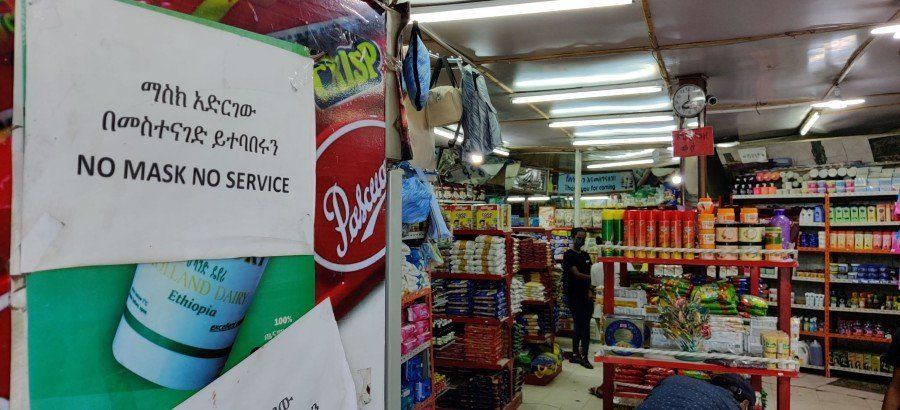
A local supermarket
We were struck by the contrast between the urgent tone of the messages from the Embassy and the relaxed demeanor of our friends and colleagues. Lulled by their positive outlook, we decided to stay put for a few more days and see how the situation unfolded. At this point, we were nearing the very end of our work permit application process, and we held a tiny bit of hope that we could immediately leave for our project sites in the south, far removed from the conflict areas.
Sudden evacuation request
As we prepared to settle in for the weekend after lunch on the Friday, November 5th, we received a call from our Grant Manager in Japan, informing us to leave Ethiopia immediately on the flight the following day, based on the request from the Foreign Ministry of Japan urging all Japanese to evacuate the country as soon as possible.
What followed was a flurry of activity in preparation for our departure in the little time left as we zipped across the city between the Ethiopian Airlines ticketing office, the Immigration Office, the Embassy, and the clinic for our PCR tests. Our minds were barely able to process everything that was happening, our emotions see-sawing between feelings of elation from the optimism of our friends and colleagues, and the dread and sadness as we imagined the possible ruins of Addis that were passing through our taxi windows.
Wish for peace
The well-being of our friends weighed heavily on our minds as we called them to say our goodbyes while waiting to board our Narita-bound flight.
We wish and pray for a quick and peaceful resolution to the conflict in Ethiopia, and we certainly hope to return again very very soon.

